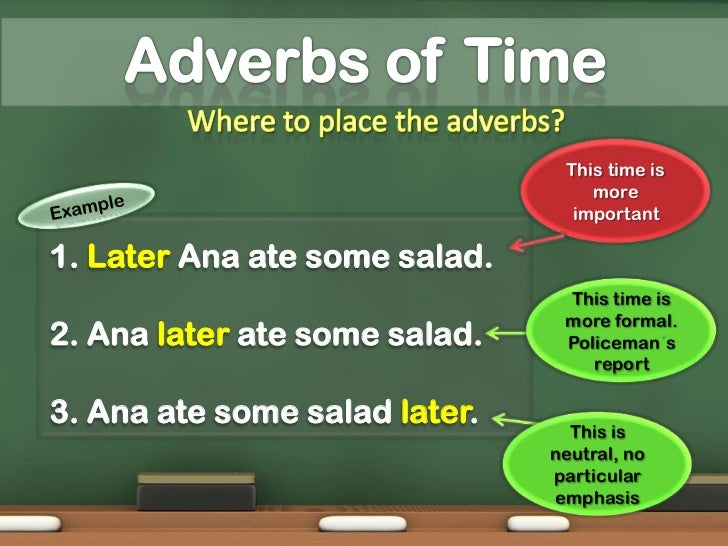Adverb Of Time Definition : The Adverb Clause / When something happens adverbials of time.. Time adverbials ks2 area word that describes when, for how long, or how often. Learn the definition of 'adverb of time'. An adverb is a word, or phrase, which modifies verbs, adjectives or other adverbs to describe how, where or when an action took place. However, we should always keep them in order by putting the time duration at first followed by frequency and exact time. Adverbial phrase is a group of words showing when, how long or how often something happens.
An adverb is a word, or phrase, which modifies verbs, adjectives or other adverbs to describe how, where or when an action took place. Since + point in time. Time adverbs can tell us about when an action happens, (now, soon, etc.) or how frequently an action happens (usually, always, etc.) dictionary. Adverbs of time tell us at what time (when) or for how long (duration) something happens or is the case. The adverbs of time tell us when an action takes time, its duration and frequency.

I've not heard from her since sunday.
Adverbs of time tell us when something happens. The time passed in such meditations, and when the teacher came, the lesson about the adverbs of place and time and manner of action was not ready, and the teacher was not only displeased, but hurt. An adverb is a word which modifies a verb, an adjective or another adverb. What is an adverb of time? These adverbs can describe how often, how long or when something takes place. When something happens adverbials of time. Now, then, later, yesterday, today, tonight, tomorrow, etc. Adverbs of time can also tell you how long something lasted or lasts. Adverbs are nouns that function as modifiers of other elements of the clause. However, their usage is a bit more complex, so we will examine. Adverbs of time tell us at what time (when) or for how. Adverbial phrases containing the word since are always followed by a point in time. Definitions of adjectives of quality exercise in english (score adverbs of time examples:
Early, late, since, ago, formerly, before, after, now, soon, immediately, later. • yesterday my problems seemed so far away. An adverb is a word which modifies a verb, an adjective or another adverb. I went to a party yesterday. Adverbs of time tell us when an action happened, but also for how long, and how often.

However, we should always keep them in order by putting the time duration at first followed by frequency and exact time.
Their dog has been barking. Adverbs that change or qualify the meaning of a sentence by telling us when things happen are defined as adverbs of time. Adverbial phrases containing the word since are always followed by a point in time. For + period of time. Based on the tense they express therefore, be careful with the verb tenses opens in new window whenever you are using adverbs of time. Early, late, since, ago, formerly, before, after, now, soon, immediately, later. Whether the action is done in past, in present or in future. • yesterday my problems seemed so far away. This article provides plenty of examples. Now, then, later, yesterday, today, tonight, tomorrow, etc. They express a period of time. Adverbs of time tell us at what time (when) or for how. You can place it at the start of the sentence to put a different emphasis on the time.
This article provides plenty of examples. The adverbs in this group include: Those adverbs which give us exact period/time are called definite adverbs of time. As a locating adverb, it contributes to the temporal interpretation of the sentence in which it occurs, the time interval that it designates, as well as the relation that holds. A word that tells the time of an action is called adverb of time.
Those adverbs which give us exact period/time are called definite adverbs of time.
Adverbs of time can also tell you how long something lasted or lasts. What is an adverb of time? It tells us when an action happened besides how long, how often. This article provides plenty of examples. Time adverbs can tell us about when an action happens, (now, soon, etc.) or how frequently an action happens (usually, always, etc.) dictionary. I went to a party yesterday. There is also a specific category of time adverbs that describe frequency, or how often something happens or is the case; Time adverbials are just what you may expect from your previous studied of adverbs. They answer the question when or how often did the action occur? The time passed in such meditations, and when the teacher came, the lesson about the adverbs of place and time and manner of action was not ready, and the teacher was not only displeased, but hurt. An adverb is a word which modifies a verb, an adjective or another adverb. Those adverbs which give us exact period/time are called definite adverbs of time. Check out the pronunciation, synonyms and grammar.
Some adverbs and adverb phrases answer the question when, they are called adverbs of time adverb of time. Finally, she showed up after two hours.

0 Comments